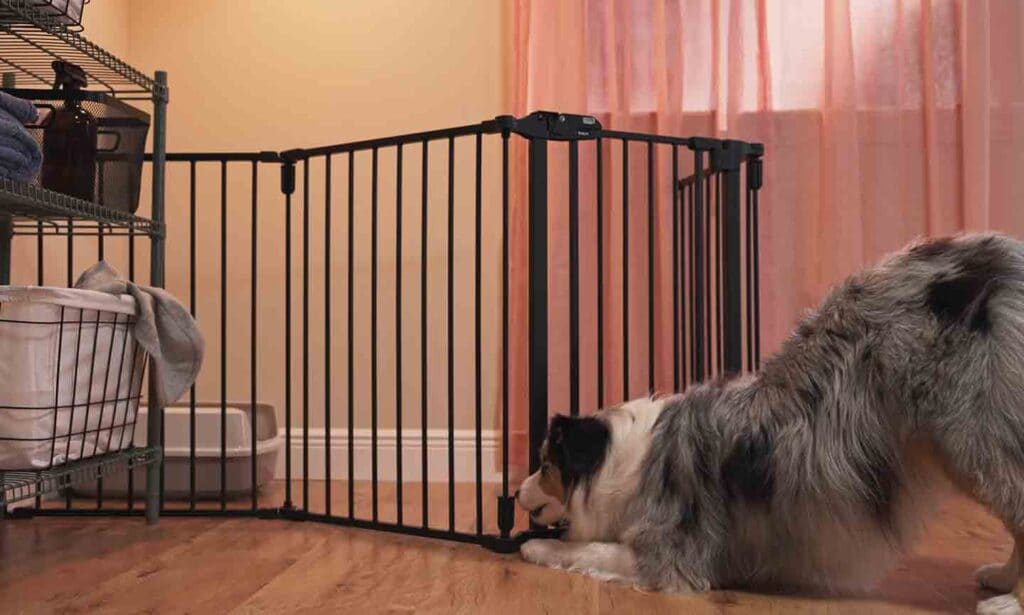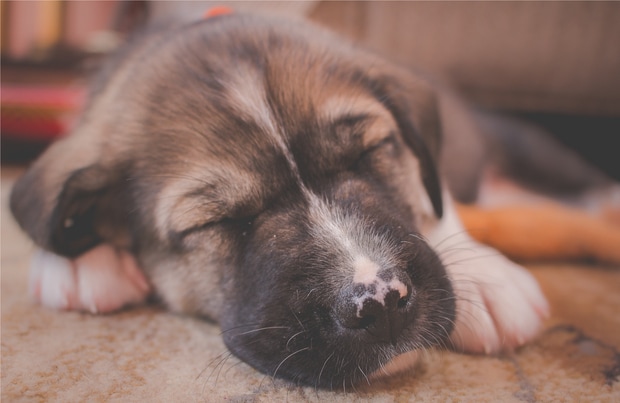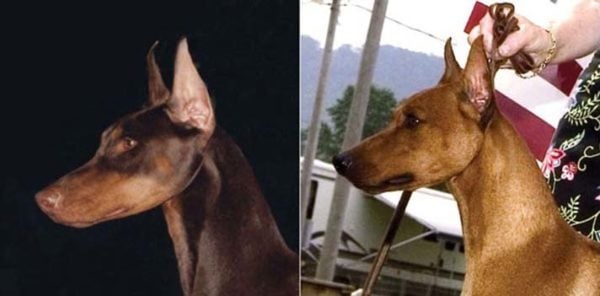We’re about to have a conversation about poop—more specifically, about why dogs eat poop. This weird dog behavior is a little unsettling, at least to first-time dog parents, yet very common, as many longtime doggy parents know.
So, why do dogs eat poop? The answer isn’t one-size-fits-all. Dogs can begin eating feces for several reasons. While some of these are normal, others are a sign of health or behavioral issues. We spoke to vet experts to learn more.
What Is Coprophagia?
Eating weird things isn’t a novel phenomenon, but in the canine world, dogs who eat poop aren’t considered peculiar by their pack. This behavior even has its own name: canine conspecific coprophagy, or simply coprophagia. It could be their own poop they’re eating or another dog’s feces—or even droppings from the cat’s litter box. But unless you’re a dog, you probably don’t understand the motivation behind this strange dog behavior.
Why Does My Dog Eat Poop? Is It Normal?
A dog eating poop is considered normal in some cases, such as when they’re cleaning their puppy’s backside. (Consider it a hazard of motherhood.) However, various theories exist as to why a dog eats poop. A dog eating poop could possibly be due to medical conditions or another cause for concern.
When a Dog Eating Poop Is Normal
Mom Grooming Her Pups
Female dogs will lick their puppies’ bottoms to stimulate bowel movements. During this routine grooming of their young to keep them clean, they end up eating feces, says Dr. Allyson Harris, DVM, founder and CEO of Woodlawn Animal Hospital in Chicago, Illinois. For mother dogs who’ve just had puppies, it’s “part of the instinctive grooming and husbandry,” Dr. Harris explains—and therefore nothing to worry about.
Puppies Using Their Mouths to Discover the World
A puppy may eat poop because they picked up the behavior from their mother, Dr. Harris says. In fact, this pet behavior is very common in puppies.
“They discover the world through their mouths,” Dr. Harris says. “Apparently, everything has to be tasted!”
When a Dog Eating Poop Is Not-So-Normal
Attention-Seeking Behavior
Believe it or not, some dogs will eat poo to get attention.
“If the [pet parent] responds dramatically when their pet engages in coprophagia, the dog might associate this behavior with the attention it craves,” says Dr. Sara Beth Ochoa, DVM, a veterinarian at Animal Hospital of West Monroe in West Monroe, Louisiana, and the co-founder of How To Pets.
So, when your pup wants your attention, they may just eat poop because they know you’ll respond!
Dietary Deficiency
Dogs who eat poop might not be getting everything they need in their diet.
Possible causes include:
- Pica: This is a condition that causes a dog to eat odd items that aren’t usually considered food, like poop. It may be a behavioral habit, but it can be from a medical condition or a dietary deficiency.
- Low quality of food: Poor-quality food may lead your dog to eat poop.
- Not enough food: Are you feeding your dog enough of their dog food? Check with your vet to find out how much your dog should be eating.
- Vitamin B deficiency: When a dog eats another dog’s poop, it could be because the poop contains undigested food, which in turn may have trace amounts of vitamin B, Dr. Ochoa explains.
- Malabsorption: If a dog isn’t properly absorbing their food, they may eat poop to try to gain the nutrients they’re not getting.
Reacting to Punishment
Dogs who have been punished for having accidents may sometimes eat their poop rather than have to deal with “the wrath of Mom or Dad,’’ says Dr. Harris.
In terms of dog psychology, if a dog is punished by being yelled at or having their nose rubbed in their mess, they may learn to fear the act of going to the bathroom. This might even be learned by your dog if you show dismay when you’re cleaning up a mess.
Other Possible Reasons Dogs Eat Poop
Dr. Ochoa says there are other causes you may want to consider, including the following:
- Medical conditions: Medical problems that have an impact on a dog’s appetite can lead to poop-eating. These include diabetes and thyroid issues.
- Medications: Certain medications can stimulate appetite and increase the likelihood of your dog eating poop. These meds can include steroids, thyroid meds, antibiotics, some psychiatric meds, appetite stimulants and anti-nausea meds. Additionally, any medications that cause GI upset can increase the likelihood that your dog will eat poop.
- Intestinal parasites: A dog who has worms or intestinal parasites may eat poop in an effort to replace lost nutrients.
- Enzyme deficiencies: When a dog lacks enzymes necessary for the breakdown of food, they may try to get the nutrients they are missing from undigested food in other dogs’ feces.
- Exocrine pancreatic insufficiency (EPI): This medical condition affects the pancreas’s ability to produce enzymes that your dog needs to digest their food, Dr. Ochoa explains. Your dog may eat poop to get more nutrients.
- Stress or anxiety: Eating feces can become a coping mechanism for a dog experiencing stress, anxiety or boredom.
- Habit: Before weaning, a puppy can learn coprophagia from their mom because mother dogs clean up after puppies by eating their feces.
Why Do Dogs Eat Cat Poop?
Does your dog have a taste for things they find in a cat litter box? This dog behavior is pretty normal, and you might often find your pooch hanging out near the litter box like a little scavenger.
So why exactly do dogs consume cat poop?
“Cat foods are extremely high in protein, and they typically have a very strong odor,” says Dr. Harris. “Some dogs feel if they can’t get the cat’s food on the way in, they’ll get it coming out!”
Although this is the most likely reason for ingesting cat poop, check with your vet to make sure it’s not caused by an underlying health condition.
How To Get a Dog to Stop Eating Poop
The solution to putting a stop to your dog eating feces depends on the cause.

Feed an Appropriate Diet
Work with your vet to ensure your dog is eating a balanced diet and that their food is high-quality and nutritionally sound. Feed your pup meals at regular intervals (two to four times per day, depending on age and breed).
Never decrease the amount of food you give your dog in an effort to have them produce less stool. Not providing the proper amount of food might lead to dogs eating poop because they’re so hungry that they must resort to it.

Give Your Dog Positive Attention
If the coprophagia is due to your dog looking for attention, your best bet is to stop “rewarding” the attention-seeking poop-eating with a big response. Instead, give your pup plenty of positive reinforcement for good behavior and love in other situations.

Teach Your Pup to Be Clean
This means teaching them to eat, sleep and play in separate areas from their waste and cleaning up any used dog potty pads or messes promptly.
Train Them to "Drop It" or Walk Away
Teach your dog how to “leave it” and “come.” (And don’t forget to use positive reinforcement when training them!)

Be Consistent With Potty Breaks
Set a schedule for your dog to go outside to potty. Check with a vet about how often they need to go out. If you need help staying on schedule, try using our printable potty training chart.
Remember to always give your pup positive reinforcement when potty training (or during any dog training for that matter).
If your adult dog has accidents, schedule an appointment with your vet to find out what may be the cause.

Provide Mental Enrichment
Keeping your dog’s mind busy and their focus and energy directed toward toys may lower the likelihood of your dog eating poop, says Dr. Ochoa. These items can “[address] underlying problems like boredom, stress and anxiety.”
While she notes that this isn’t a one-size-fits-all solution and each dog may respond differently, the following toys may be worth trying.

Consider a Digestive Enzyme or Probiotic
Digestive enzymes are vital substances that aid in breaking down food particles, facilitating their smooth journey through the digestive tract, Dr. Ochoa says. And when a dog’s diet lacks these essential enzymes, “it might result in them savoring their own excrement in an attempt to reclaim these lost nutrients.”
Protease is one of the most effective enzymes to consider, according to Dr. Ochoa. It may help guide your pup away from eating feces. One enzyme that contains protease is Epizyme Powder.
Probiotics are another product you could consider trying. Beneficial bacteria that promote a healthy gut in dogs, probiotics can boost the immune system, aid in digestion and help balance good and bad gut bacteria, Dr. Ochoa says, adding that probiotics may help with poop-eating. Nutramax Proviable Probiotics & Prebiotics Capsules Digestive Supplement is a highly rated probiotic.
While an enzyme may do the trick, Dr. Ochoa reminds pet parents that “each dog is unique, and results might vary.” Same with probiotics. While they “may have a positive impact on the digestive system, they cannot guarantee a solution for this particular behavior.”

Make the Poop Inaccessible
If it’s a case of your dog eating cat poop because they’re treasure hunting in the litter box, with no signs of health issues, then the solution’s easy: Move the litter box to a place that’s inaccessible to your poop-eaters.
Use a pet gate, like the Carlson Pet Products gate, to block your dog from the litter box. Or try placing the box on a side table with steps leading up to it (so your kitty doesn’t have to jump right into the litter box).

Consult Your Vet
Take your furry friend to the vet to check for intestinal parasites, medical conditions (including Cushing disease, diabetes and thyroid disease) and anxiety.
“Clients potentially waste valuable time and resources by making poor choices before getting counsel from a local veterinarian,” Dr. Harris says. “Beware of ‘Dr. Google’!”

Be Observant
Finally, remember to always keep an eye on your doggo. Watch for sudden or unexplained weight loss, never finding poop, breath that smells like feces, loose stools or parasites in the stool.
Why Do Dogs Do That?
Share:




















